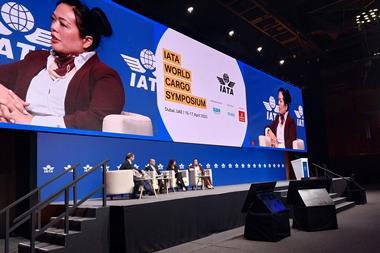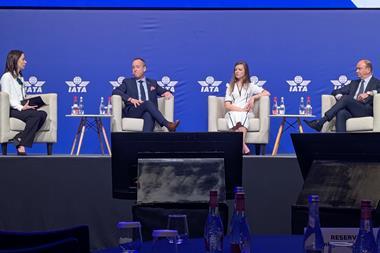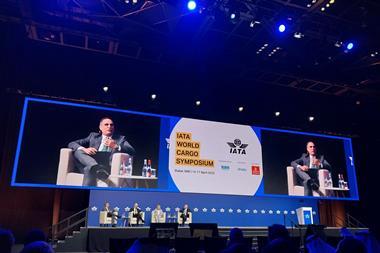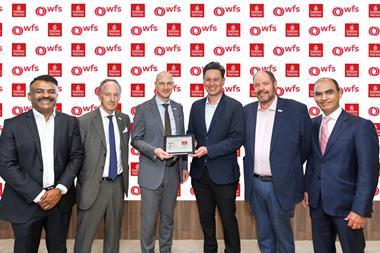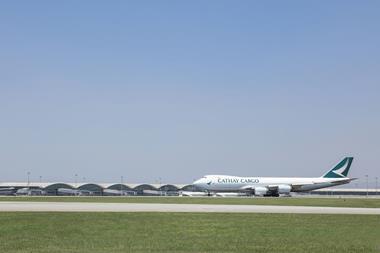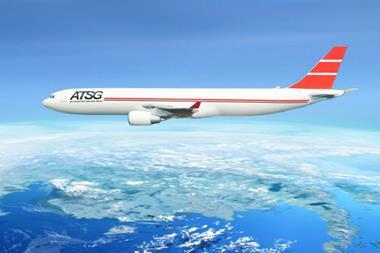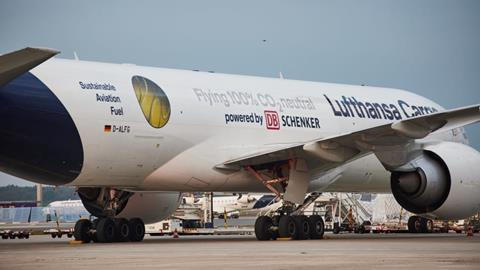
Lufthansa Cargo and DB Schenker have highlighted their joint sustainability efforts by putting special livery onto a freighter aircraft.
The companies marked one of Lufthansa Cargo's Boeing 777s (D-ALFG) with the words "Flying 100% CO2 neutral powered by DB Schenker" and an illustration of sustainable aviation fuel (SAF).
The companies said the livery draws attention to the issue of SAF and invites customers to transport their freight in a CO2-neutral manner.
Ashwin Bhat, Lufthansa Cargo's chief commercial officer, said: "We are delighted to have DB Schenker at our side, a partner who is so energetically promoting the reduction of CO2 in the air freight industry. The special livery gives us the opportunity to draw attention to our joint commitment worldwide. It also shows that we take our support of the United Nations’ ‘Climate Action’ Goal very seriously.
"The increased use of SAF and a modern freighter fleet are measures with a great impact to sustainably reduce our CO2 emissions."
Thorsten Meincke, global board member for air and ocean freight at DB Schenker, added: "Sustainability is not just a nice-to-have. It is our declared goal to transport more goods in an environmentally friendly way. In doing so, we roll up our sleeves where it is particularly important to be active – in air transport.
"Together with Lufthansa Cargo, we offer a regular carbon neutral cargo flight connection. We are now celebrating this milestone on an aircraft for everyone to see. We are proud that we have already been able to inspire many customers with our green offer. With this special jet, we are driving awareness for our sustainability partnership around the world."
Lufthansa Cargo starts work on ArtCube facility at Frankfurt Airport
Lufthansa Cargo homes in on fuel reduction through aircraft coating
DB Schenker sees revenues and profits increase in 2020
In April, DB Schenker and Lufthansa Cargo teamed up to launch a regular CO2-neutral freighter route, operating between Frankfurt and Shanghai.
In November last year, Lufthansa Cargo and DB Schenker partnered for the first time to carry out the first ever CO2-neutral freighter flights powered by SAF.
The flights took place on November 29 and operated from Frankfurt to Shanghai utilising a Boeing 777 freighter aircraft.
Goods from Siemens Healthineers and other companies were transported on the flight.
A maximum mix of 50% SAF is allowed to be used on a flight, but airlines get around this problem by covering the flights from a centralised pool of SAF from their overall jet fuel procurement.
In recent months, other companies have been highlighting their sustainability efforts, as the airfreight sector works towards operating in a more environmentally-friendly way.
Last month, CEVA Logistics joined United Airlines’ sustainability initiative, the Eco-Skies Alliance.
In March, Kuehne+Nagel (K+N) entered into an agreement with American Airlines to deploy 11m litres of sustainable aviation fuel (SAF).
In December last year, DHL Express signed a deal with energy firm Shell Aviation that will see it being supplied sustainable aviation fuel (SAF) to power flights from Amsterdam Schiphol Airport.
Also in December, Air France KLM Martinair Cargo (AFKLMP) and K+N partnered to launch a zero emissions airfreight route, enabling K+N’s cargo on Los Angeles—Amsterdam flights to be covered by SAF.
Atlas Air also carried out a flight with a SAF mix.
SAF refers to sustainable, synthetic kerosene. It is currently produced mainly from biomass, for example from sustainable or recyclable vegetable and cooking oils. In the future, non-plant-based renewable fuels will also be available.
By using SAF, the fossil CO2 emissions of a flight with conventional kerosene are avoided. During combustion in the engine, only CO2 is released that was previously removed from the atmosphere, for example during plant growth.





